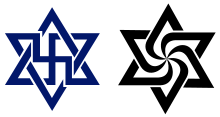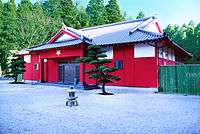Korindo (Raëlian temple)


Korindo is a Raëlian temple near Narito, Japan. It is the first such temple,[1] dedicated to the Elohim, and meditation.[2]
Korindo is a Japanese word, that means "light coming from the sky". [2] It is the first recognised Raëlian temple for about 1500 active members and promoters of this UFO religion, mentors, and over 50,000 followers of Raëlism[3] from about 84 countries,[4] and is situated at a village near Narita in Japan.[2] In Asia, Japan dominates in proportion of the people, who have faith in Raëlism, as compared to other Asian nations.[1] It is believed by the Raëlians that life on Earth was created by the extraterrestrial scientists from space, in their own image and resemblance.[2][3][5][6] Moreover, Raëlians further claims that it was a Sunday, when Adam and Eve were brought into being by the Elohim.[7]
Inauguration
The temple was inaugurated on October 7, 2010 in the memory of the 35th anniversary of the second meeting of Rael with the Elohim.[2] Raël also claims to have visited the Elohim's planet at that time.[3] Many Raëlians, and over 100 mentors attended the inauguration of the Korindo, which coincided with a two-day seminar for the Raëlians.[2]
See also
References
- 1 2 Beyer, Catherine (2010-12-19). "Raelians Build First Elohim Temple". About.com Guide. Retrieved 2011-08-17.
- 1 2 3 4 5 6 "The Korindo, first Raelian temple dedicated to the Elohim". Raelianews. Retrieved 2011-08-17.
- 1 2 3 "Raelians and Cloning: Are They for Real? Researcher Massimo Introvigne Talks About an Atheistic Religion (Part 1)". Cesnur. Retrieved 2011-08-17.
- ↑ "Raelians". About.com. Retrieved 2011-08-17.
- ↑ Beyer, Catherine. "The Elohim within the Raelian Religion". About.com Guide. Retrieved 2011-08-17.
- ↑ "The Message". Rael. Retrieved 2011-08-17.
- ↑ Beyer, Catherine. "Raelian Movement: An Introduction to Raelians for Beginners". About.com Guide. Retrieved 2011-08-17.
External links
- Official Website of the Raëlian Movement
- Official News and Views of the Raëlian Movement
- Who are the Raëlians? David Chazan, BBC News 2002.